| Srl | Item |
| 1 |
ID:
123229
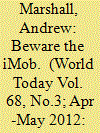

|
|
|
| 2 |
ID:
118642
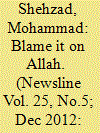

|
|
|
| 3 |
ID:
119751
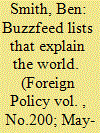

|
|
|
| 4 |
ID:
114365
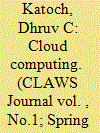

|
|
|
| 5 |
ID:
178249
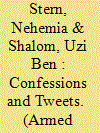

|
|
|
|
|
| Summary/Abstract |
This article explores the social media postings of Israel Defense Forces (IDF) soldiers on two different and unofficial Facebook groups. While scholars of armed forces and society have noted the growing importance that militaries have placed on digital media, there is little data regarding the unofficial uses and meanings that regular soldiers themselves make of social networking sites. With an anthropological focus on everyday experiences, we argue that the social media activity of IDF personnel highlights the quotidian aspects of military life in ways that reverberate beyond the strictly ideological or political facets of their service. Here, soldiers can express their frustrations with military bureaucracy, while also presenting a lighthearted (and positive) commentary on a shared rite of passage. This research opens a window into the lives and dilemmas of the first generation of Israeli soldiers to employ new media as a taken for granted aspect of their service.
|
|
|
|
|
|
|
|
|
|
|
|
|
|
|
|
| 6 |
ID:
109527
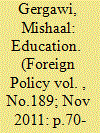

|
|
|
| 7 |
ID:
187163
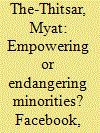

|
|
|
|
|
| Summary/Abstract |
Language policies play a major role in ethnic conflict because they affect the right of speakers to choose and use their preferred language(s), and help determine courses of action to maintain, assert or defend such rights. There has been insufficient analysis on the role of social media, particularly Facebook, in strengthening or undermining the survival of minority languages and collective identity in multi-ethnic countries. This paper uses Myanmar as a case study to demonstrate the extent to which Facebook language policies influence language use practices of minorities in Myanmar. While Facebook’s selection of Burmese as a ‘Facebook language’ has privileged the use of Myanmar’s majority language at the expense of its minority languages, it has simultaneously provided opportunities for ethnic minorities to preserve and promote their languages and cultures.
|
|
|
|
|
|
|
|
|
|
|
|
|
|
|
|
| 8 |
ID:
162612
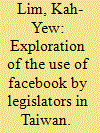

|
|
|
|
|
| Summary/Abstract |
Previous studies have found that how to win an election is always an important question for legislators. Their behavior in lawmaking and constituency service is also associated with their aspirations for re-election. In the era of booming social media, how legislators can use social media to increase their chances for election and re-election has become a compelling issue. This study argues that legislators do indeed maximize the benefits of social media to win elections. On this account, this study intends to explore two main questions: (1) What kind of messages legislators choose to convey to voters on their fan pages; and (2) Whether the political characteristics of legislators affect the types of the messages they convey there. In this study, posts were collected from the fan pages of 25 Taiwanese legislators. These text messages were then converted into numerical data that could be quantitatively analyzed with the content analysis method. It was found that legislators tend to start with soft messages in their communications with the public. They share some details of their daily schedules and everyday lives with their voters before they begin image building and posting political material. This study also found that the political characteristics of legislators, including their party membership, their status either as a district or proportional representation (PR) legislator, and their incumbency all affect the content of posts on their fan pages. For example, compared to Kuomintang (KMT) and Democratic Progressive Party (DPP) legislators who share information from their daily lives, New Power Party (NPP) legislators prefer to share only political information. PR legislators devote more attention than district legislators to criticizing the government on their fan pages. Incumbents are significantly less likely than challengers to share daily information, but more likely to share political information. This study found that the aforementioned differences have resulted from the many ways that different types of legislators use to increase their chances of winning an election.
|
|
|
|
|
|
|
|
|
|
|
|
|
|
|
|
| 9 |
ID:
149225
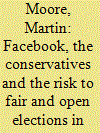

|
|
|
|
|
| Summary/Abstract |
The Conservative party spent £1.2 million on Facebook during the UK 2015 general election campaign. This enabled the party to target specific voters in marginal constituencies with tailored messages. Their use of Facebook in 2015 shows how central digital media had become to their campaign communication. It also shows, however, that this communication may be compromising the principles of fair and open elections in the UK, for example by allowing parties to effectively bypass constituency spending limits and avoid transparency. Unless electoral legislation and regulation are changed to take account of developments in digital media they are liable to become increasingly anachronistic and ineffective.
|
|
|
|
|
|
|
|
|
|
|
|
|
|
|
|
| 10 |
ID:
161649
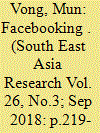

|
|
|
|
|
| Summary/Abstract |
This article takes a critical view of online activism as its point of departure and explores how the activities of Cambodian youth on Facebook have spilled over into formal politics. Contrary to concerns that Facebook and other social media tools distract activists from more effective means of political participation, this article suggests that facebooking has contributed positively to offline political participation. More importantly, the petty acts of discussing and sharing information on Facebook have, on occasion, succeeded in triggering changes in government decisions and behaviours. In developing these arguments, we draw upon everyday politics perspectives which provide the theoretical ground to qualify facebooking as political and make sense of its importance.
|
|
|
|
|
|
|
|
|
|
|
|
|
|
|
|
| 11 |
ID:
155905
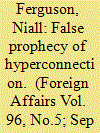

|
|
|
| 12 |
ID:
158163
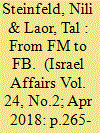

|
|
|
|
|
| Summary/Abstract |
The article explores Israeli radio stations’ activity on Facebook and analyses the most popular content in terms of various engagement indexes. It finds that the format of a post, its language and content, all affect the level and nature of user engagement with the post. Moreover, it appears that both stations and users turn to Facebook primarily for promotional and PR purposes and less so for promoting mutual interaction and dialogue between stations and their audiences, thus complementing the traditional medium without utilising the full range of opportunities this new platform has to offer radio.
|
|
|
|
|
|
|
|
|
|
|
|
|
|
|
|
| 13 |
ID:
095851
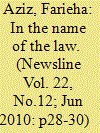

|
|
|
| 14 |
ID:
095850
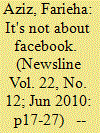

|
|
|
| 15 |
ID:
115925


|
|
|
| 16 |
ID:
132068
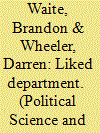

|
|
|
|
|
| Publication |
2014.
|
| Summary/Abstract |
The rapid diffusion of online social networking sites is changing the very nature of organizational communication. This is particularly true in higher education, where Facebook is increasingly being used as a means to engage with students, faculty, and alumni. Unfortunately, academic departments seeking to adopt such technologies often fail to understand the unique opportunities and challenges that accompany the adoption of social media. This article illuminates recent changes in organizational communication and describes the adoption of Facebook by a political science department at a midwestern state university. The authors develop a typology of Facebook posts to determine which types of information generate the most audience activity. They explain how this information can assist academic departments as they seek to bolster recruitment and retention of students, as well as ongoing investment from faculty and alumni.
|
|
|
|
|
|
|
|
|
|
|
|
|
|
|
|
| 17 |
ID:
095852
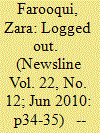

|
|
|
| 18 |
ID:
171488
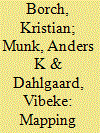

|
|
|
|
|
| Summary/Abstract |
Social media is a powerful communication tool through its universality and ease of access, which potentially has a huge impact on implementation of wind power. This study investigate a large corpus of Danish Facebook pages advocating anti-wind power viewpoints, distinguishing between localisation, different user groups, subjects and activity types. In doing this the following questions are answered: How localised are wind protests on Facebook?; To what extent can we perform a qualitative discourse analysis on different groups of Facebook users?; What can be said about the differences between community and cross-cutting Facebook users?; How are the voiced concerns articulated?; How are concerns managed by Facebook users?
|
|
|
|
|
|
|
|
|
|
|
|
|
|
|
|
| 19 |
ID:
164959
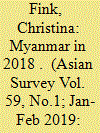

|
|
|
|
|
| Summary/Abstract |
The Rohingya crisis cast a long shadow over Myanmar in 2018, and prospects for the Rohingya refugees in Bangladesh were bleak. The peace process with ethnic armed organizations remained stalled. Myanmar signed major investment agreements with China that could have a dramatic effect on the economy.
|
|
|
|
|
|
|
|
|
|
|
|
|
|
|
|
| 20 |
ID:
149191
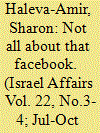

|
|
|
|
|
| Summary/Abstract |
Only 26 months separate the elections for the 19th Knesset (January 2013) from those for the 20th (March 2015), yet the digital campaigns employed in the latter demonstrate interesting shifts. Using empirical data collected from social network sites and from journalistic campaign coverage, this article analyses the use of the online sphere by parties, candidates and audiences, identifying evolving shifts in digital campaigning. The findings point out the reoccurrence of some trends, whether intensified or otherwise, as well as the emergence of new trends that illustrate the evolution of Israeli online campaigning. The prominent recurring trends are (1) personal politics; (2) professionalized campaigns; (3) alternative funding models; (4) social activism; and (5) constant violation of election law provisions. The new trends include: (1) Facebook’s alternatives; and (2) assimilation of web culture into the campaigns. Analysing the findings suggests that current campaigns focus on entertainment rather than on real discourse and stress the obsolescence of the current legal regime
|
|
|
|
|
|
|
|
|
|
|
|
|
|
|
|